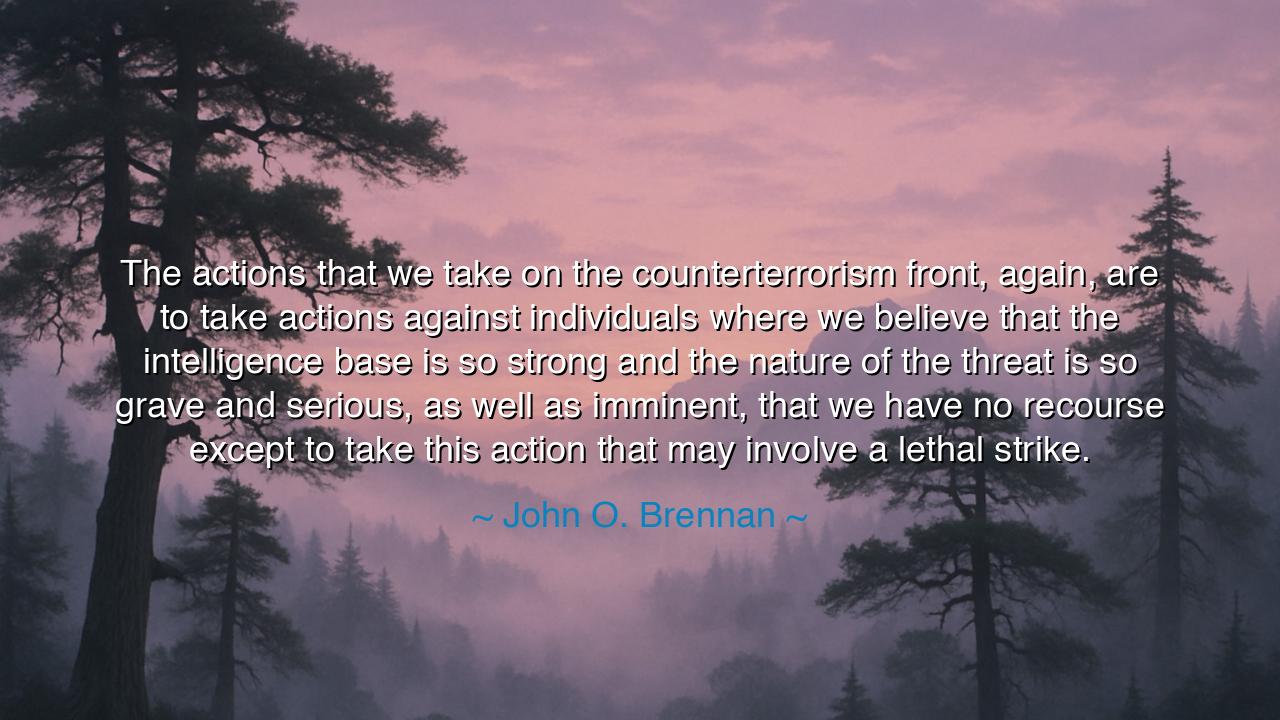
The actions that we take on the counterterrorism front, again
The actions that we take on the counterterrorism front, again, are to take actions against individuals where we believe that the intelligence base is so strong and the nature of the threat is so grave and serious, as well as imminent, that we have no recourse except to take this action that may involve a lethal strike.






In the grave and measured voice of John O. Brennan, a man who stood at the crossroads of secrecy and statecraft, we hear the burdened reasoning of those who must choose between peace and peril: “The actions that we take on the counterterrorism front, again, are to take actions against individuals where we believe that the intelligence base is so strong and the nature of the threat is so grave and serious, as well as imminent, that we have no recourse except to take this action that may involve a lethal strike.” These words are not the boast of power but the confession of a heavy necessity — the solemn calculus of a people who must defend the many from the designs of the few. In them resides the ancient agon: how to wield force without forfeiting justice; how to act decisively while remaining true to law and conscience.
The origin of this utterance lies in the modern age of asymmetry, when violence no longer marches in the formations of armies but hides in networks and cells. Brennan spoke as a steward of national security during an era transformed by terrorism, by globalized communication, and by weapons that reach far beyond borders. His phrase — that action is taken where the intelligence base is strong and the threat imminent — is the distilled logic of contemporary counterterror strategy: to act when knowledge is sufficient and danger immediate. Yet even as he speaks of necessity, the cadence of his words betrays restraint; they are words chosen by someone who knows that the use of lethal force carries moral weight beyond measure.
History offers us mirrors to reflect this dilemma. Consider the raid that found Osama bin Laden in 2011 — a deed born of painstaking intelligence, patient surveillance, and the conviction that the threat his presence embodied was grave, serious, and imminent. The strike parried further plots and offered a measure of justice to countless victims; yet it also reopened questions about sovereignty, secrecy, and the ethics of killing even the most monstrous among us. Or recall the age of antiquity when generals took counsel before an assault: victory demanded more than courage — it required knowledge of the enemy, the rightness of cause, and the tempering hand of law. Brennan’s words walk in that procession of restraint and resolve.
There is another strand to his message: the plea for rigor and humility. To speak of an intelligence base is to demand evidence, cross-checks, and honest doubt. Intelligence misread becomes catastrophe; haste without verification breeds error that cannot be retrieved. Thus the modern steward must bind himself to procedures — legal review, oversight by councils, measures to avoid collateral harm, and the relentless pursuit of alternatives to killing. The ancients taught that the just soldier must first exhaust peace; only then may he wield the sword. Brennan’s formulation is a modern echo of that old maxim: lethal force as last resort, not first recourse.
From this truth flow moral lessons for the citizen and for the state. First, recognize that the defense of the many sometimes requires terrible choices; this does not make those choices easy, nor does it remove the duty of accountability. Second, insist — as a people — upon transparency where possible, oversight where secrecy is necessary, and the constant striving to reduce harm to innocents. Democracies survive such strains by subjecting even life-and-death decisions to law, scrutiny, and debate. The fewer the shadows that cloak action, the firmer the claim that necessity, not convenience, drove the deed.
Practically, then, what may we do? For leaders and practitioners: strengthen the quality of intelligence by investing in human sources and lawful collection, by rigorous analysis, by red teams that test assumptions, and by legal counsel that interrogates ethics as well as law. Prioritize non-lethal options, prevention through diplomacy and development, and measures that protect civilians. For citizens: demand oversight, educate yourself about the trade-offs, support institutions that balance security with rights, and foster communities that resist the root causes of radicalism. Courageous defense and compassionate restraint must walk together if a society is to remain both secure and humane.
So hear this counsel and carry it like a lamp into the dark places of policy and conscience: strength of evidence, seriousness of threat, imminence of danger, and the finality of lethal action — these are the pillars upon which Brennan’s words stand. Use force only when all other channels are spent, and when you do use it, bind it with law, moral inquiry, and the relentless effort to heal the wounds that make men dangerous. For the true strength of a people is not only in their weapons, but in their wisdom to choose when and why to use them.






AAdministratorAdministrator
Welcome, honored guests. Please leave a comment, we will respond soon